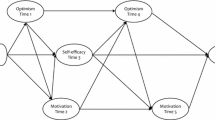Abstract
This article introduces this special issue by establishing a conceptual foundation for thinking about how students' conceptions of time influence motivation and achievement. In particular, we describe how students' perceptions of the utility of what they are learning for their futures can positively affect motivation. Temporal perspective is tied to current models of motivation and learning such as intrinsic motivation and self-regulation. We present 2 purposes for organizing this issue: (a) initiating discussion and research about how conceptions of the future influence and are influenced by students' motivation and (b) bridging gaps in the field between American and international perspectives on learning and motivation. We conclude by introducing the 6 articles that comprise this special issue of Educational Psychology Review.
Similar content being viewed by others
References
American Psychological Association: Presidential Task Force on Psychology in Education(1993), January). Learner-Centered Psychological Principles: Guidelines for School Redesign and Reform, American Psychological Association, Washington, DC.
Bong, M., and Skaalvik, E. M. (2003). Academic self-concept and self-efficacy: How different are they really? Educ. Psychol. Rev. 15: 1-40.
Cameron, J. E. (1999). Social identity and the pursuit of possible selves: Implications for the psychological well-being of university students. Group Dyn.: Theory, Res., Pract. 3: 179-189.
Carstensen, L., Isaacowitz, M. D., and Charles, S. T. (1999). Taking time seriously: A theory of socioemotional selectivity. Am. Psychol. 54: 165-181.
Csikszentmihalyi, M., Rathunde, K., and Whalen, S. (1993). Talented Teenagers: Roots of Success and Failure, Cambridge University Press, New York.
Csikszentmihalyi, M., and Schneider, B. (2000). Becoming Adult: How Teenagers Prepare for the World of Work, Basic Books, New York.
Doucette-Gates, A. (1999). Hope: Sustaining a vision of the future. In C. W. Branch (Ed.), Adolescent gangs: Old issues, new approaches. (pp. 57-85). Philadelphia, PA: Brunner/Mazel, Inc.
Fung, H. H., Carstensen, L. L., and Lutz, A. M. (1999). Influence of time on social preferences: Implications for life-span development. Psychol. Aging 14: 595-604.
Gjesme, T., and Nygard, R. (1996). Advances in Motivation, Scandinavian University Press, Boston.
Holman, E. A., and Silver, R. C. (1998). Getting “Stuck” in the past temporal orientation and coping with trauma. J. Pers. Soc. Psychol. 74: 1146-1163.
Husman, J., and Lens, W. (1999). The role of the future in student motivation. Educ. Psychol. 34: 113-125.
James, W. (1890). The Principles of Psychology, Holt, New York.
Joireman, J., Anderson, J., and Strathman, A. (2003). The aggression paradox: Understanding links among aggression, sensation seeking, and the consideration of future consequences. J Pers. Soc. Psychol. 84: 1287-1302.
Keough, K. A., Zimbardo, P. G., Boyd, J. N. (1999). Who's smoking, drinking, and using drugs? Time perspective as a predictor of substance abuse. Basic Applied Social Psychology, 21: 149-164.
Markus, H., and Nurius, P. (1986). Possible selves. Am. Psychol. 41: 954-969.
Mischel, W. (1974). Processes in delay of gratification. In L. Berkowitz (Series Ed.), Advances in experimental social psychology (Vol. 7, pp. 249-292). San Diego, CA: Academic Press.
Moore, C., and Lemmon, K. (2001). The Self in Time: Developmental Perspectives, Erlbaum, Mahwah, NJ.
Nuttin, J., and Lens, W. (1985). Future Time Perspective and Motivation: Theory and Research Method, Leuven University Press, Leuven, Belgium.
Oyserman, D., Terry, K., and Bybee, D. (2002). A possible selves intervention to enhance school involvement. J. Adolesc. 25(3): 313-326.
Peetsma, T. T. D., and Stouthard, M. E. A. (1999). Future-time perspective: Analysis of a facet-designed questionnaire. Eur. J. Psychol. Assess. 15(2): 99-105.
Roberts, W. A. (2002). Are animals stuck in time? Psychol. Bull. 128: 473-489.
Deci, E., and Ryan, R. (2000). Self-determination theory and the facilitation of intrinsic motivation, social development, and well-being. Am. Psychol. 55: 68-78.
Simons, J., Dewitte, S., and Lens, W. (2000). Wanting to have vs. wanting to be: The effect of perceived instrumentality on goal orientation. Br. J. Psychol. 91: 335-351.
Stipek, D. (2002). Motivation to Learn: Integrating theory and Practice, 4th edn., Allyn and Bacon, Boston.
Suddendorf, T., and Corballis, M. C. (1997). Mental time travel and the evolution of the human mind. Genet. Soc., Gen. Psychol. Monogr. 123: 133-167.
Tucker, J. A., Vuchinich, R. E., and Rippens, P. D. (2002). Predicting natural resolution of alcohol-related problems: A prospective behavioral economic analysis. Exp. Clin. Psychopharmacol. 10: 248-257.
Wigfield, A., & Eccles, J. S. (2002). The development of ompetence beliefs, expectancies for success, and achievement values from childhood through adolescence. In Wigfield, A. E., Jacquelynne, S. (Ed.), Development of achievement motivation. A volume in the educational psychology series. (pp. 91-120). San Diego, CA: Academic Press.
Zimbardo, P. G., and Boyd, J. N. (1999). Putting time in perspective: A valid, reliable individual differences metric. J. Pers. Soc. Psychol. 77: 1271-1288.
Author information
Authors and Affiliations
Corresponding author
Rights and permissions
About this article
Cite this article
Kauffman, D.F., Husman, J. Effects of Time Perspective on Student Motivation: Introduction to a Special Issue . Educational Psychology Review 16, 1–7 (2004). https://doi.org/10.1023/B:EDPR.0000012342.37854.58
Issue Date:
DOI: https://doi.org/10.1023/B:EDPR.0000012342.37854.58




